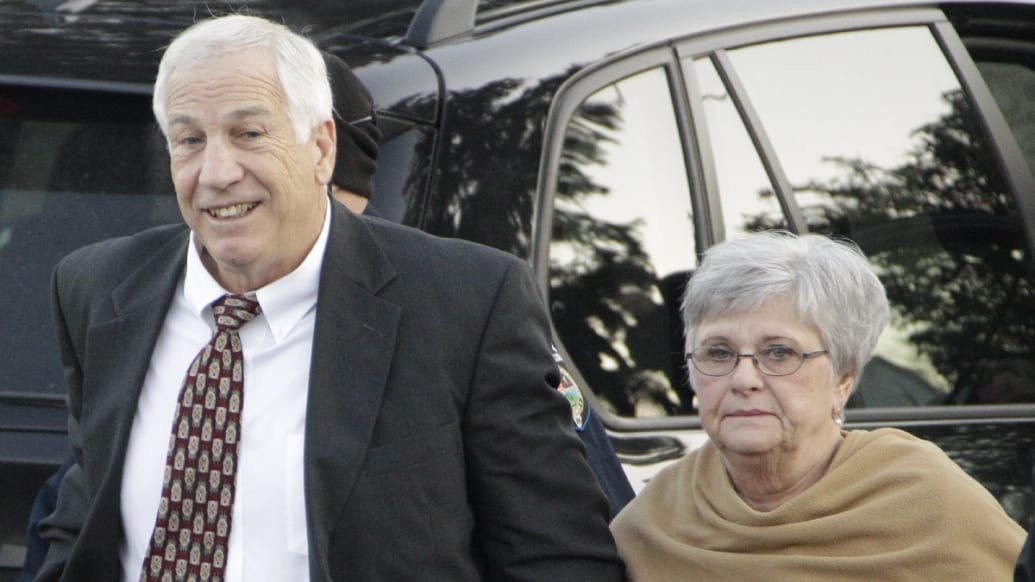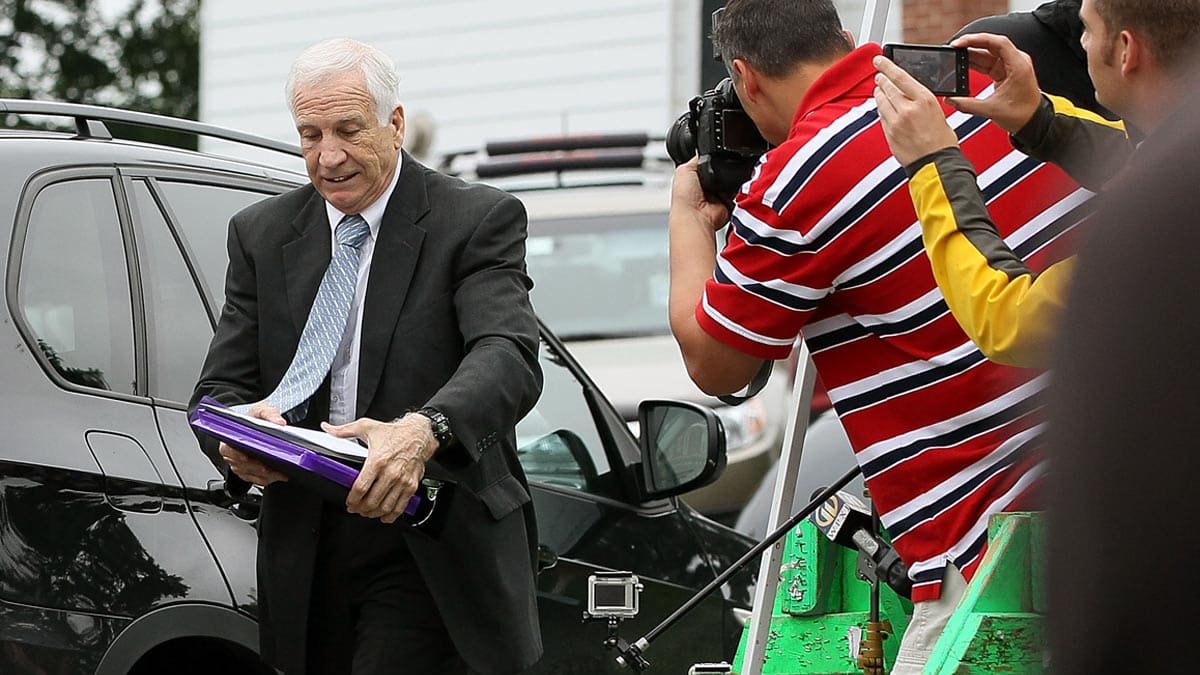The defense came on like gangbusters on this sixth day of the Jerry Sandusky child sex-abuse trial. From character witnesses and cops to dueling doctors and the much-anticipated testimony of the ex-coach’s wife, Dottie, the jury barely had a moment to catch its breath as they heard testimony from an astounding 21 witnesses.

The possibility that a Sandusky might take the stand has consumed much of the courtroom chatter over the last week—and today it became a reality. Mrs. Jerry Sandusky was captivating as she appeared on the stand, clad in a light green sweater and speaking in the soft tones of a housewife. She is a small woman with a short bob, and as she settled in to the witness box, she cast a long glance at her husband and gave him a wink, a quick reassuring nod, and a smile. He returned the silent signal with a big wide grin on his face, obviously happy to see his wife in the courtroom from which she was banned on opening day.
“You are aware of the allegations against your husband?” defense attorney Joe Amendola asked. Mrs. Sandusky simply answered, “Yes.” And then Amendola ran down a list of the young accuser’s names, asking if she recognized each. There was only one name she didn’t know, she said, and she admitted that most of the boys had spent nights in the Sandusky home. She also admitted that her husband “would go down and tell them good night.” Down, that is, to the basement full of boys’ games and an adjoining bedroom with a waterbed, and the place where several accusers told the same court that they had been horribly violated.
Dottie, whose nickname is “Sarge,” she said, because she is strict and expects things to run a certain way, explained that her husband went to bed before her 90 to 95 percent of the time. “I always stayed up late,” she said. Each time she was asked how many nights a particular accuser stayed overnight in her home, she stuttered and stammered.
“I...I…I have no idea,” she would say with an apologetic smile. “I don’t remember. I’m sorry...My memory in time is not good.”
“How often do you go into the basement area?” her husband’s lawyer asked, confirming she keeps a food freezer there.
“Oh, once a day,” she estimated. “During football season, more. I make things and freeze them.”
“Is your basement soundproof?” Amendola asked.
“No,” she answered. She laughed and shook her head.
After establishing that Mrs. Sandusky’s hearing is intact despite her 60-plus years, Amendola asked the question on so many court watchers’ minds: “You ever hear one of the youngsters yelling for help from the basement?”
“No,” Dottie Sandusky said firmly.
On cross-examination, prosecutor Joe McGettigan asked whether she knew of her husband’s 1998 run-in with the law, which involved a young boy who testified here last week. She quietly acknowledged she had become aware there were allegations that Sandusky had showered with a young boy and that his mother had called police. She learned of it, she said, “after it happened,” and added that the Commonwealth of Pennsylvania had mailed the Sanduskys a letter saying no charges would be filed.
Then, the prosecutor’s zinger: McGettigan brought up each young accuser by name, as well as the name of Michael McQueary, the assistant Penn State football coach who testified he saw Sandusky raping a young boy in the university’s showers in February 2001.
“Do you know any reason why these young people and Mike McQueary would lie?” he asked.
The courtroom went quiet. Finally, Dottie Sandusky stammered, “I…I…I don’t know what it would be for.”
Prior to Mrs. Sandusky, the defense’s other star witness was Dr. Elliot Atkins, a psychologist who specializes, in part, in treating people with personality disorders. His conclusions, too, would not go unchallenged.
“Mr. Sandusky clearly meets the criteria for Histrionic Personality Disorder,” the witness told the jury. They stared blankly back. For the two hours, the courtroom morphed into a lecture hall, with Dr. Atkins referencing a PowerPoint presentation on the court’s big screen as he attempted to explain the disorder, also known as HPD. It refers to people, he explained, who act in ways to ensure they are always the center of attention—which could include inappropriate sexual behavior. “They toss out old relations for the excitement of new ones,” said Dr. Atkins. “They may embarrass others by excessive public displays of affection.” They are, he said, serial huggers who often have impaired relationships with same-sex companions.
The defense’s implication was clear: Jerry Sandusky is not a pedophile but a misunderstood man whose “excessive” emotions had raised false alarms.
Atkins based his findings on grand jury transcripts; two commonly used psychological personality tests he administered to Sandusky during a six-hour evaluation; a copy of Sandusky’s own book Touched; and a stack of letters the defendant wrote to alleged victim No. 4—a young man who had claimed that Sandusky treated him “like his girlfriend” and stalked him when he tried to pull away. Dr. Atkins revealed that he charges $375 per hour.
The prosecution’s expert, Dr. John Sebastian O’Brien, studied the same material and spent about two and a half hours evaluating Sandusky on Father’s Day. Asked whether he thought the two tests showed Sandusky suffers from Histrionic Personality Disorder, O’Brien stated flatly that one of the tests had concluded he did not. The other psychological test concluded that Sandusky’s personality was “within the normal limits,” according to Dr. O’Brien, and his own opinion was that since the defendant is so high-functioning that he couldn’t possibly suffer from HPD.
“It is my opinion that [HPD] doesn’t exist in this case.”
“Could it be that a different diagnosis is present?” McGettigan prodded.
“Yes,” said Dr. O’Brien.
“Would one be a psycho-sexual disorder with a specific attraction to adolescents?”
“Yes it would,” the Dr. said in a firm tone of voice. But he was quick to add that “it’s still unproven—based only on pre-trial evidence.”
Dr. O’Brien makes $450 per hour; at the end of the day, few observers would dispute he was worth every penny to the prosecution.
It was a whirlwind day in court. In the day’s first hour alone, the defense presented 11 witnesses in rapid succession, each one testifying about Sandusky’s character. There were former campers from his Second Mile Charity, former neighbors, and members of his church, St. Paul’s United Methodist. To each witness, defense attorney Amendola asked a variation of the same question: “Prior to these charges being filed, did you know Mr. Sandusky to be a law-abiding, truthful, peaceful, non-violent person?”
At the defense table, Jerry Sandusky smiled broadly at his friends. Each one said yes.
“And what what was his reputation in the community?” Amendola repeatedly asked.
“Excellent. Among my children and grandchildren, Jerry Sandusky is a father figure. He’s also respected for what he did professionally,” church member Jack Willenbrock told the jury.
“He was a very respected man in the community for all he’s done for the children,” a former Second Mile camper said with a smile.
“All the people I know think Jerry is a wonderful man,” said Sandusky family friend Joyce Porter, who described how kind the former Penn State coach and his wife have been to her 14 children, five of whom are adopted. Porter said her son Matt, who has Down Syndrome, is especially fond of the Sanduskys. When asked, “Who’s the best?” she said, her son enthusiastically replies, “Jerrr-eee!” As Porter crossed back to take a seat in the spectators section, she patted Sandusky on the back.
“Thanks to Jerry, half my [college] tuition was paid,” 28-year-old Kelly Jo Simco said, looking at the jury to make sure they had noted Sandusky’s kindness.
Lance Mehl, a former Penn State football player and retired New York Jet, was asked to describe Sandusky’s previous reputation. In a deep booming voice, the player-turned-probation officer replied, “Very good! We all looked up to him. He is a class act.”
Aside from defending their client’s character, the defense team also sought to discredit his accusers. Two Pennsylvania state troopers, Colonel Scott Rossman and the retired Corporal Joseph Leiter, were questioned about the technique they used in questioning the “50 or 60” young men contacted during the initial Sandusky investigation.
But it was one interviewed in particular that Amendola was interested in, zeroing in on a 16-minute section of a recording the troopers made of their initial interview with alleged victim No. 4, who is 28 years old. The recorder was inadvertently left on when the young man had stepped out to have a cigarette. During a casual discussion with the No. 4’s lawyer, Corporal Leiter is heard agreeing to tell the nervous accuser when he returns that he was not the only one revealing graphic, sexual things about Sandusky. Sandusky’s team believes that tainted the young man’s revelations.
“You mentioned [to accuser No. 4] rape, oral sex, and other activities you got from other accusers, right?” defense attorney Karl Rominger asked.
“Yes,” the corporal said. “But nothing more specific than that.”
The jurors bowed their heads and seemed to listen intently to the audio tape. Juror No. 8—dubbed Mr. Rogers by the media—put his hand to his mouth and concentrated on a spot on the floor. Juror No. 4, in the back row, closed his eyes while listening. Others took a few notes. It was impossible to tell if the panel was buying Amendola’s “tainted witness” argument.
They also heard a childhood friend of accuser No. 4 describe him as being “a dishonest person who embellished stories.”
Meanwhile, in a salvo directed at discrediting alleged victim No. 1, a next door neighbor testified that the boy’s mother, upon learning that her son may have been molested by Sandusky, exclaimed, “I will own his house!” At another time, Josh Fravel told the jury, she said, “When this is over [I’ll] have a nice big house in the country where her dogs could run free.” Fravel said the boy told him, “When this is all over I’ll have a nice new Jeep.”
Keeping up the trial’s astonishing pace, the jury is expected to begin deliberating on Thursday after closing arguments. The prosecution’s brief rebuttal is expected to include a newly discovered, un-aired clip from an interview Sandusky gave to NBC’s Bob Costas in November—one that many legal experts consider to have been ill-advised. In one unaired portion, Sandusky rambles into what could be construed as a self-incriminating statement.
“I didn’t go around seeking out every young person for sexual needs that I’ve helped,” he says. “There are many that I didn’t have...I hardly had any contact with, who I have helped in many, many ways.”

